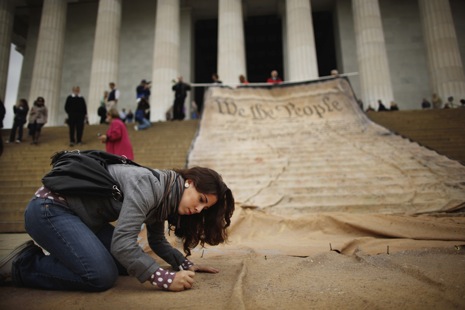We had a simple question when Eric Byler and I began our journey around the country with Story of America: Why have we become so divided as a nation and how can we become more united?
As I watched the video of our interview with James Morgan of Bakersville, NC, a mining town in the Appalachian Mountains, I finally recognized what really propelled this journey. It wasn’t some academic answer to my question; it was something deeply personal.
At the end of the video, when James catches himself being unfairly judgmental of people on welfare, when he realizes that he is not so different from the people he’d been judging, you can see the light bulb go on over his head. It took me months longer, but a light bulb went on for me as well when I revisited this experience watching the video: I’m not so different from James.
At some level, I’d been judging James and other white Christian conservatives, particularly in the South. At the time of the interview, back in August 2013, I remember feeling a lot of compassion for James as he tried to figure out what to do about his personal dilemma, “Should I draw from SSI? Do I need the help?”
James’ personal need is in terrible conflict with his political beliefs, his sense of self, and a story about America, I’ll call it the Confederate South story, that he had being using to make sense of life. The basic story that I had been using, I’ll call it the New America story, is different from his, but it operates in the same way in my life.
The basic story gives us a constant framework for understanding most of what happens in the public sphere and where the public and private intersect: these are the good people; these are the bad people; these are our values; these are their values, etc.
His basic story of America had led him to think that “most people on welfare are lazy and don’t deserve it.” My basic story of America had led me to think that James and his father are stuck in their regressive worldview, and their cognitive problem is making America stuck, zapping our hope for the future.
Looking back, it’s amazing that James opened up to us about his dilemma and the details of his situation. If he hadn’t done that, I may not see him as a person with a unique personal story. This conversation challenged the three of us to go outside of our basic story of America to understand each other.
The experience with James gives me hope for the possibility of greater unity in America. And, it is this hope that I’ve been pursuing for several years, propelling our journey across the country. To be honest, by the end of 2012 when we started our journey — after several years of bitter acrimony between the two parties, after the Tea Party became a household name, and especially after the Sandy Hook Massacre — I was just heartbroken about where we were as a country. I felt cheated of a period of time that was supposed to be about hope and change.
There is another reason why I have more hope right now. It is because of something I’ll call “Story Therapy.” Think of it this way: what would happen if all of us critically examined our basic story of America and see if those stories cause us to make assumptions about people in our lives? What would happen if people could meet each other and see unique individuals with unique stories rather than characters in a pre-existing, pre-scripted story?
What the Confederate South Story and the New America Story get wrong is this: We are still using the framework we use to tell the story of the Civil War. Half of the people with one set of moral beliefs and economic interests fights the other half. However, the story of America today is really about a few people with concentrated power and wealth with the majority of people around the country living on the edge of poverty. This has been a growing problem since 1979, and it became dramatically more pronounced because of the 2008 financial crisis. The story of America today is about a growing plutocracy.
Because many of us are so attached to our basic stories and so certain we know who our enemies are, we are missing this big picture. And even if we see the big picture, because we are a house divided, we as a people are weak and cannot seem to fight the growing plutocracy.

We will stay divided and grow even weaker if we don’t talk to other people with different beliefs, ideas, experiences, and appearances. We will continue to make assumptions about others, fear them in some cases, hate them at times, and allow politicians and oligarchs to exploit that division for political and financial gains.
If we are able to see each other as unique individuals with unique stories, I believe we will begin to awaken the “We the People” within us. Like any therapy, however, Story Therapy requires us get out of our comfort zone and be vulnerable to each other in the way that James Morgan allowed himself to be.
In these partisan and divided times, “We the People” as a building block of our social identities has been laying dormant. If we want to keep our democratic republic, we must awaken the We the People within us.
Please support Story of America with a tax deductible donation.
